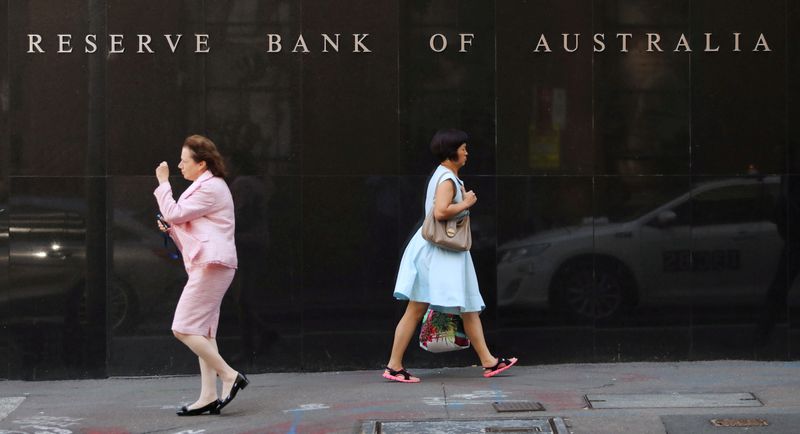[ad_1]
 © Reuters. FILE PHOTO: Two women walk next to the Reserve Bank of Australia headquarters in central Sydney, Australia February 6, 2018. REUTERS/Daniel Munoz/File Photo
© Reuters. FILE PHOTO: Two women walk next to the Reserve Bank of Australia headquarters in central Sydney, Australia February 6, 2018. REUTERS/Daniel Munoz/File PhotoBy Wayne Cole
SYDNEY (Reuters) – Australia’s current account surplus widened sharply in the June quarter as resource exports were boosted by both prices and volumes, making a sizable contribution to economic growth.
Data from the Australian Bureau of Statistics out on Tuesday showed the surplus ballooned to A$18.3 billion ($12.50 billion), from A$2.8 billion the previous quarter and just under forecasts of A$20.8 billion.
Exports of goods jumped almost 15% as miners shipped more resources to Asian customers amid surging prices, while imports tapered off after a very strong March quarter.
As a result, net exports will add 1.0 percentage points to gross domestic product (GDP), above forecasts for a 0.9 percentage point contribution.
The boom in export earnings has showered miners in extra profits while boosting employment, wages and tax receipts, which should lead to healthy growth in the income side of gross domestic product (GDP).
Other data out on Tuesday showed government spending added a slight 0.1 percentage points to GDP, figures for which are due on Wednesday. Analysts had forecast GDP to rise 1.0% in the quarter, lifting annual growth to a solid 3.5% from 3.3%.
That resilience is a major reason the Reserve Bank of Australia (RBA) is widely expected to hike interest rates by another 50 basis points to a seven-year high of 2.35% on Tuesday, the fifth rise since May.
Markets are wagering rates could peak around 3.85% next year given inflation is running at a 21-year high of 6.1% and likely to top 7% by Christmas.
Most analysts are not as hawkish, in part because rising rates have already blown a hole in the housing market where prices are falling at the fastest pace in 40 years.
The rise in rates already delivered will also add around A$560 a month in repayments to the average A$620,000 mortgage, a deadweight for a population that hold a record A$2 trillion in mortgage debt.
An ANZ survey of consumers out on Tuesday showed confidence had picked up by 1.3% last week, but only if you rented.
“For people paying off a mortgage and for those who own their home confidence is sharply lower by 19% and 13% respectively since the RBA’s first rate hike in May,” said David Plank, head of Australian economics at ANZ.
“The recovery in consumer confidence is encouraging, but it remains in very negative territory despite the lowest unemployment rate in decades.”
($1 = 1.4643 Australian dollars)
[ad_2]
Source link
(This article is generated through the syndicated feed sources, Financetin doesn’t own any part of this article)
